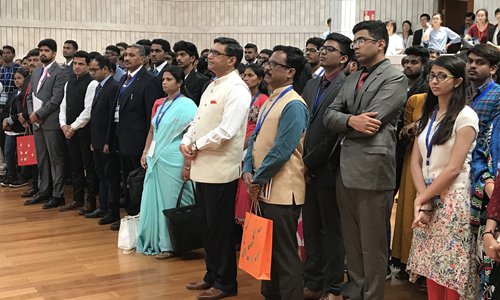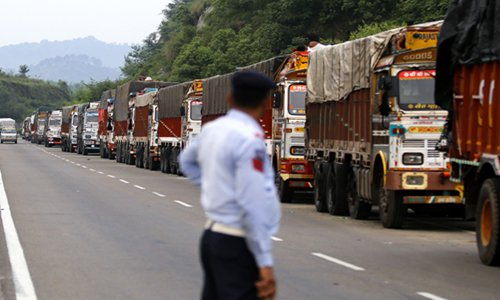China, India FMs expected to cool down Kashmir row
By Zhang Han Source:Global Times Published: 2019/8/11 23:33:41 Last Updated: 2019/8/12 0:23:59
India’s irrational move in territorial disputes may trigger war: analyst

The India Ambassador to China Vikram Misri (center) and youths from the China-India exchange program listen to a speech by a team leader during the reception in July at the Indian Embassy in China. Photo: Li Jieyi/GT
The three-day visit by India's top diplomat to China, which comes amid rising tensions between Pakistan and India over territorial disputes, is expected to help stabilize the situation and avoid further conflicts arising from misjudgment or irrational decisions, Chinese observers noted on Sunday.
India's External Affairs Minister Subrahmanyam Jaishankar arrived in Beijing on Sunday, Indian news agency PTI reported. Jaishankar is the first Indian minister to visit China since the beginning of the second term of Indian Prime Minister Narendra Modi.
The visit comes after India's controversial move on August 5 to scrap the special status of Indian-controlled Kashmir and announce Ladakh as Union Territory, which is a disputed region with China.
China's Foreign Ministry blasted the move as damaging China's territorial sovereignty and "unacceptable and void."
The move also triggered a strong response from Pakistan over the past week, which downgraded diplomatic ties and suspended trade with India. Pakistan also asked India to withdraw its high commissioner to Pakistan.
China and India will have sufficient communications over the issues during the Indian minister's visit, and India is expected to explain its concerns and plans to the Chinese side in a frank manner to earn understanding from the Chinese side, Qian Feng, a research fellow at the national strategy institute of Tsinghua University, told the Global Times on Sunday.
China will also reiterate its stance, as well as its discontent and objection to India's move that bypassed the mechanism for territorial disputes and resorted to unilateral approaches, said Qian.
Zhao Gancheng, a research fellow at the Shanghai Institutes for International Studies, noted that India's move absolutely hampered positive momentum and disturbed China-India border talks.
India does not want bilateral ties, which witnessed hard-won stability and improvement after the border standoff in 2017, to go sour because of territorial disputes again, said analysts.
However, they noted that India's sudden and arbitrary move on the disputed region sparked concern about how far the country's territorial ambition would go.
If India furthers its unreasonable claims to the middle and eastern part of the China-India border and provokes with military actions, China will hit back with strong countermeasures, Zhao warned.
During the three-day visit, Jaishankar will co-chair the second meeting of China-India high-level people-to-people exchanges mechanism with Chinese State Councilor and Foreign Minister Wang Yi.
The mechanism, formally launched in December 2018, is part of the consensus reached by top leaders of the two countries during their first informal summit in Wuhan, capital of Central China's Hubei Province in April 2018, the Xinhua News Agency reported.
Mediator role
China is expected to play the role of a mediator between its two important neighbors in South Asia and to help prevent the situation from "going out of control," said Qian.
Pakistani Foreign Minister Shah Mahmood Qureshi paid a special emergency visit to China Friday evening and briefed Wang in detail Pakistan's view, position and countermeasures on the latest developments in Kashmir.

A policeman looks at trucks stranded on the Jammu-Srinagar highway in Nagrota, near Jammu on Friday, following a security lockdown in the region after the Indian government stripped Jammu and Kashmir of their autonomy. Photo: VCG
China believes any unilateral action that may complicate the situation in Kashmir should not be taken, Wang said during the meeting.
China and Pakistan are all-weather strategic partners and China will continue to firmly support Pakistan in safeguarding its legitimate rights and uphold fairness for Pakistan in international affairs, Wang said.
India's move has violated Pakistan's interest and seriously challenged the status quo, Hu Zhiyong, a research fellow at the Institute of International Relations of the Shanghai Academy of Social Sciences, told the Global Times Sunday.
Hu noted the unilateral act by India might lead to a war with Pakistan.
China doesn't want the Kashmir issue to hamper China-India relations and disturb regional stability but the problem can only be settled through dialogue, Zhao noted. What India will do largely decides what happens next, he said.
Posted in: DIPLOMACY,CHINA-INDIA